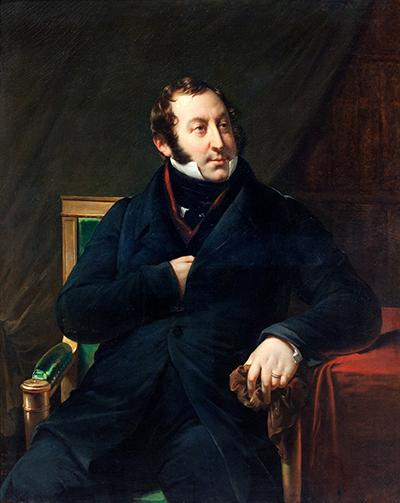Gioachino Rossini

Born: February 29, 1792, Pesaro, Italy
Died: November 13, 1868, Paris, France
Duetto in D Major for Cello and Double Bass
- Composed: 1824
- Premiere: July 21, 1824 in London by cellist David Salomons and bassist Domenico Dragonetti
- Duration: approx. 15 minutes
Following the triumph of Semiramide in Venice during the spring of 1823, Rossini was engaged by Giovanni Benelli, the impresario of the King’s Theatre in London, to supervise a season of his operas there and to compose a new piece for that city. After a stop in Paris, Rossini and his wife, the celebrated Spanish soprano Isabella Colbran, arrived in the English capital on December 13, 1823, rather severely the worse for a pummeling endured during the crossing of the Channel. An invitation for an audience with George IV arrived at his lodgings in Regent Street two days later, but it was not until December 29 that Rossini had sufficiently recovered to meet the King. He was very warmly received by the court in the Pavilion at Brighton, where he was treated to a concert of his music by His Majesty’s personal orchestra. King and composer got on famously, and they met several times during the following six months to share supper and sing duets to Rossini’s piano accompaniments. Such royal imprimatur, of course, made Rossini the darling of the London social scene, and he received so many invitations to attend the nobility’s soirées that he found it necessary to institute the extravagant fee of £50 to insure his presence.
Although such blatantly successful mercenary conduct by a visiting composer rankled the local musicians, Rossini was simply following the accepted London practice of making foreign musical celebrities rich. Handel found success there a century before, as had Johann Christian Bach and Haydn more recently, and Rossini, ever vigilant for economic opportunity, was not about to miss his chance. Meanwhile, at the King’s Theatre, his operas were being well received and eagerly attended, but Benelli had proven imprudently generous in his contracts with his principal singers (including Colbran) and went bankrupt, thus canceling his agreement with Rossini to write a new opera—a circumstance that troubled the composer not at all, since the rigors of creative work would only have detracted from his social availability and the resultant income. On July 26, 1824, Rossini left London, having won the admiration of the King, the applause of the public and the money of the aristocracy. “During my stay in England, I received attentions that would be difficult to parallel elsewhere,” he told his biographer Ferdinand Hiller.
In mid-July, a few days before his departure, Rossini composed an unusual new piece for cello and double bass for a party in his honor at the home of David Salomons, a wealthy British financier whom Rodney Slatford, editor of the first publication of the Duetto in 1969, described as follows: “Sir David Salomons (1797-1873) was a member of a Jewish family, long resident in London, and in 1832 was one of the founders of the London and Westminster Bank. He was elected Lord Mayor of London in 1855, and became Liberal M.P. for Greenwich in 1859. It must be assumed that he was also a keen amateur cellist. Sir George Smart, the leading English conductor of the time, wrote in his journal, ‘On July 21, 1824, I dined in the City at Mr. Salomons’ to meet Rossini, who made himself most agreeable. He had been paid by Salomons £50 to compose a duet to be played by Salomons and Dragonetti, the great double-bass player.’”
The Duetto exhibits the high spirits, good taste, instrumental skill and sparkling wit that mark Rossini’s six delightful String Sonatas, those youthful jeux d’esprit that he had composed as a lad of 12, 20 years earlier. The Duetto is a remarkably friendly work that calls for considerable refinement of technique and sonority from the participants. The first movement is closest in formal type to a sonatina (sonata without development section), though Rossini did not bother to recapitulate the main theme at the expected juncture. (He was fond of altering the classical models for the overtures to some of his operas as well, where the work’s specific architecture depended more on the quality of the tunes he had invented and the sense of theatrical pacing than on the need to fulfill any abstract structural concept.) The Andante is a lyrical aria for instrumental baritones shared equally between cello and bass. The finale is a delectable morceau ("morsel") in the form of a rondo.
—Dr. Richard E. Rodda